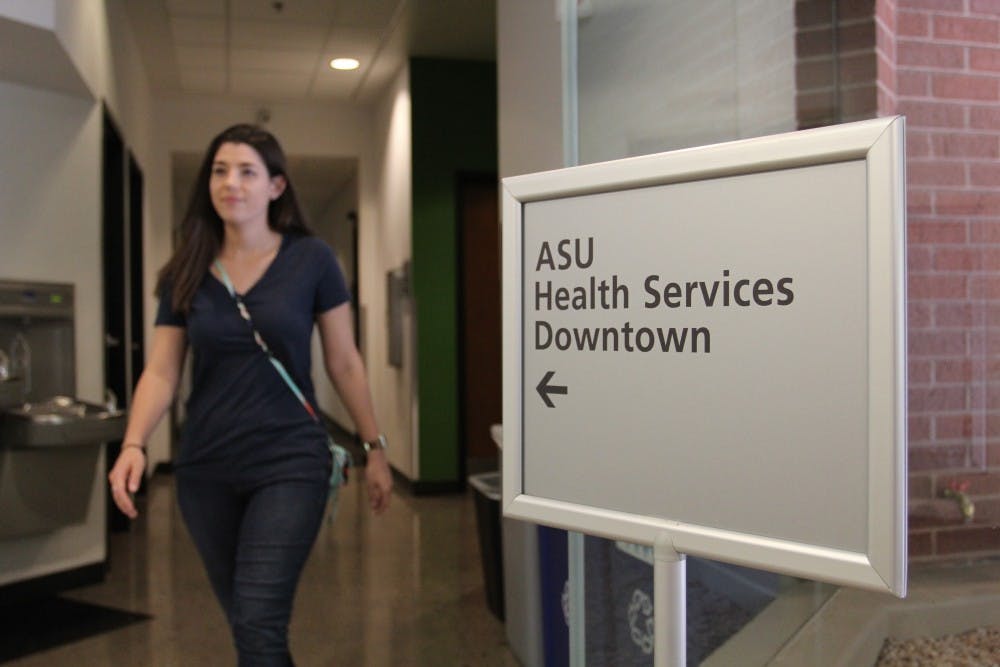Between catching a cold from living on campus to spraining an ankle during intramural sports, injuries and illness are bound to happen during a student's college career.
Located on all four campuses, ASU Health Services is able to provide basic medical services such as sexually transmitted disease testing and immunizations for students without them having to worry about obstacles such as transportation or time constraints.
One-third of students across all campuses use ASU's medical facilities each year.
“Health Services is like a pitch point (for the school),” a junior communications major Kelly Fox said. “They told us 'we have medical facilities for anything you might need.'”
However, some students say that when it comes to health services, the bad outweighs the good. For example, Health Services claims on their website that students can schedule walk-in appointments, but some say it can be hard to actually pin one down.
A simple search for "ASU Health Services" on Twitter brings up a plethora of tweets from students expressing their disdain toward the facilities throughout the years.
“If you called right now to try to talk to a nurse, they wouldn’t be able to pick up the phone,” ASU alumnus Peter Northfelt said. “That’s just how they operate.”
There is also the possibility of having to wait for a while, with the wait times being upwards of 90 minutes during high-traffic periods, according to the associate vice president for ASU Counseling and Health Services, Aaron Krasnow.
"Wait times do tend to be longer at the beginning of the day, noon and 3 p.m. due to academic scheduling," Krasnow said. "So we flex coverage to absorb more volume during those times."
Fox said she has also had negative experiences with ASU Health Services.
When she was having symptoms of extreme dehydration and intense headaches, she was able to go to Health Services and get an IV. Unfortunately, the IV didn’t work as well as it should have, and Fox needed to go back to Health Services where she was told it could be another 3 to 4 days until she could be seen again.
Fox was also never advised to visit an emergency room, even when her symptoms became more severe.
Krasnow said that Health Services only advises these measures in extreme cases.
“When someone comes in with chest pains or neurological symptoms of a certain type, we immediately call 911,” Krasnow said. “If someone comes in and can’t stop bleeding, we also say go to an emergency room.”
Because Fox wasn’t showing any of those symptoms, Health Services didn’t deem it necessary to advise a more urgent form of care.
Another issue for Fox was the inability to get test results back in a reasonable amount of time.
When she was able to return to health services, they said it could be another 3 to 4 days again to get test results back.
Northfelt also pointed out that there is a lack of consistency when it comes to which doctors will be examining students which can make it difficult to receive consistent care.
“The first couple of times I would have to tell my whole health history to this new doctor,” Northfelt said.
He said eventually he did find a doctor who worked well with and understood what was going on, but that it took more than a few visits to do so and it wasn't until shortly before graduation.
“I ended up finding a really good doctor who understood me,” Northfelt said. “They noticed any changes even if I wasn’t explicitly saying it.”
Krasnow said that it is possible for students to see the same doctor with every visit, but it does take advanced planning and can be hard to guarantee, especially with walk-ins which account for more than half of the appointments at Health Service.
Fox said she ended up abandoning Health services for an off-campus doctor who was better able to help her, but she wishes she had done so earlier.
“If I had a doctor that I knew was good (earlier), I could’ve saved myself a lot of trouble.” Fox said.
Editor's note: Peter Northfelt worked for the State Press from 2013 to 2015.
Reach the reporter at Barbara.Smith.3@asu.edu or follow @barbarasmiith on Twitter.
Like The State Press on Facebook and follow @statepress on Twitter.




